Spoiler Warning for all of Dragon Age: Origins, Dragon Age II, and Dragon Age: Inquisition
Inquisitor: Nobody has ever done… that to me before. I… enjoyed it.
The Iron Bull: Of course you did. Ben-Hassrath training, remember? Grew up learning to manipulate people. When it’s a hostile target, you give them what they want. But when it’s someone you care about, you give them what they need.
Two things before I jump in here:
1. As noted above, spoilers as always for all of Dragon Age!
2. This post contains analyses of some pretty adult romances across Dragon Age. Topically, it is a bit NSFW and is appropriate for adults only.
So here we are again on the subject of Dragon Age and romance…
In this installment, we’ll go beyond the fairytale formulas and look at some of the other potential relationships across the games. Here, we’re definitely leaving behind the hearts and flowers and entering a slightly tougher, edgier world. Here, romance may also include lies, double-crosses, emotional baggage, betrayal, abandonment, and, well… the occasional safe word.
I liked all of the sweeter, more fairytale romances I mentioned in my earlier examination of Dragon Age romances, and was really charmed by each in different ways. However, my favorites across the series have tended to be the more complex romances and relationships—those that didn’t make a beeline for true love, and which in many cases didn’t work out at all.
For me, these romances would include those of such characters as:
- Zevran
- Morrigan
- Anders
- Fenris
- Isabela
- Dorian
- Sera
- Blackwall
- The Iron Bull
- Solas
The earliest of these, and one of the best, to me, is definitely Zevran’s from Dragon Age: Origins (DAO), as his romance explores a character who seems impossibly sunny despite surviving terrible abuse in his past. However, as it goes along, we see that no matter how sexually free Zev seems, he distrusts real intimacy and closeness. This is a theme with several romances across the trilogy, from Zev, Morrigan, and Fenris, to Sera, Dorian, and more. They want love but fear the vulnerability that goes along with it.
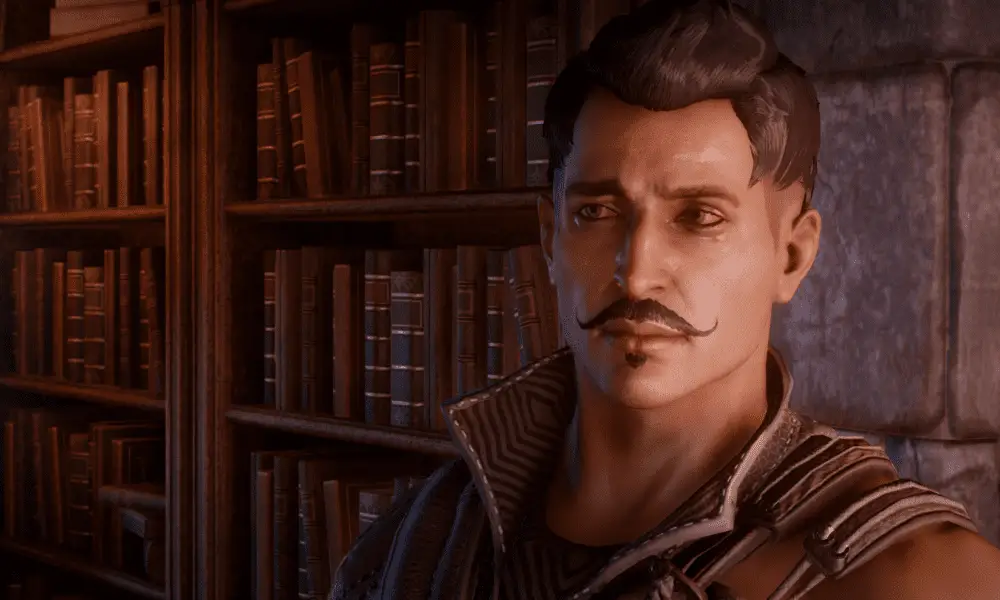
Love and Sex in Tevinter
In the above list, most of the complexities arise, as in life, out of the characters’ difficult histories, past sins, and their unwillingness to expect or even accept happiness. This is probably most true with Dorian, a ridiculously handsome noble-born mage from hostile Tevinter. Dorian has spent most of his life loathing himself and his sexual orientation because his family (and his country’s nobility) disapproves of homosexuality except as a dalliance in the shadows. In Dorian’s world, a gay man, for instance, would still be expected to marry a woman and father children. This is so important to the Tevinter nobility that Dorian reveals that his own father actually tried to change his sexual orientation with magic. It’s a really grotesque and disturbing idea that’s sadly all too relevant to our world as well. Dorian’s dialogue as created by David Gaider is both witty and searingly painful in equal measure.
Dorian’s fear of intimacy is directly tied to his own shame and abuse. Yet that makes it all the more emotional when he stops flirting and actually embarks on a relationship with a male Inquisitor. His romance also features what is easily one of the hottest and loveliest kisses in the entire game.
Dorian’s romance is complex and genuinely interesting if the Inquisitor pursues a relationship with him. However, what’s possibly even more interesting is the alternate potential storyline in which Dorian and The Iron Bull hook up instead.
The Qunari and the Vint
There’s been a lot of talk about the fact that Bull comes on pretty strong with Dorian. Some see Bull’s treatment of Dorian as harassment or even outright abuse.
I just don’t see it that way—I think it’s flirting between two very different people who know they’re attracted, and who have different baggage. Bull’s a little crass here, and he definitely comes on strong. However, I think he does that because he knows that’s what Dorian will respond to. Bull is completely different, for instance, when romancing the Inquisitor because he adjusts his approach to fit each scenario. Dorian doesn’t want hearts and flowers. He wants sex and guilt because for him the two are hopelessly interconnected. The problem with Dorian is that Dorian brings his own class issues to the table, as well as his own ambivalence about his sexuality.
Ultimately, because Bull is repeatedly shown, with eerie accuracy, to know what people want, his approach is okay with me. Especially since it’s Dorian who ultimately makes the first move and goes to Bull. I also think that Dorian only takes Bull up on the offer because of the fact that Bull is so blunt about acknowledging their attraction.
So it’s interesting, if perhaps not entirely healthy in the beginning. Their dynamics are uneven at first, because Dorian fears and half-loathes himself for his sexual impulses. Bull, on the other hand, who’s pansexual and utterly at home with himself, cannot conceive of the concept of shame when it comes to sex between consenting adults in any way. He’s completely free of hang-ups. The resulting relationship is messy, believable, and ultimately a fascinating and even sweet romance that ends up being good for both men.
Dorian’s inner damage and his hesitance to accept true love even when it’s offered results in a moving story and a more complicated romantic outcome than most. I loved the bittersweet edge to the end of his romance with the Inquisitor, which is a poignant example of how love simply isn’t always enough. For this reason, his was one of the romances in Dragon Age: Inquisition (DAI) that unexpectedly moved me the most. I also enjoyed Zevran’s assassin with the heart of gold, Isabela’s funny, sexy and incorrigible pirate, and the heartbreakingly vulnerable, tragic Anders.
However, for me, probably the end-all, be-all of the non-fairytale romances, and the ones I loved most across the trilogy, is that of The Iron Bull and Solas.
Love and Kink in Dragon Age
The Iron Bull was the first character I romanced in my very first playthrough of Dragon Age: Inquisition, and he was most certainly the first non-fairytale romance I’d ever played in an RPG. Previously, I’d romanced Liara and Thane in Mass Effect and Mass Effect 2, and Alistair in DAO on that initial playthrough. All were pretty sweet and conventional, in other words.
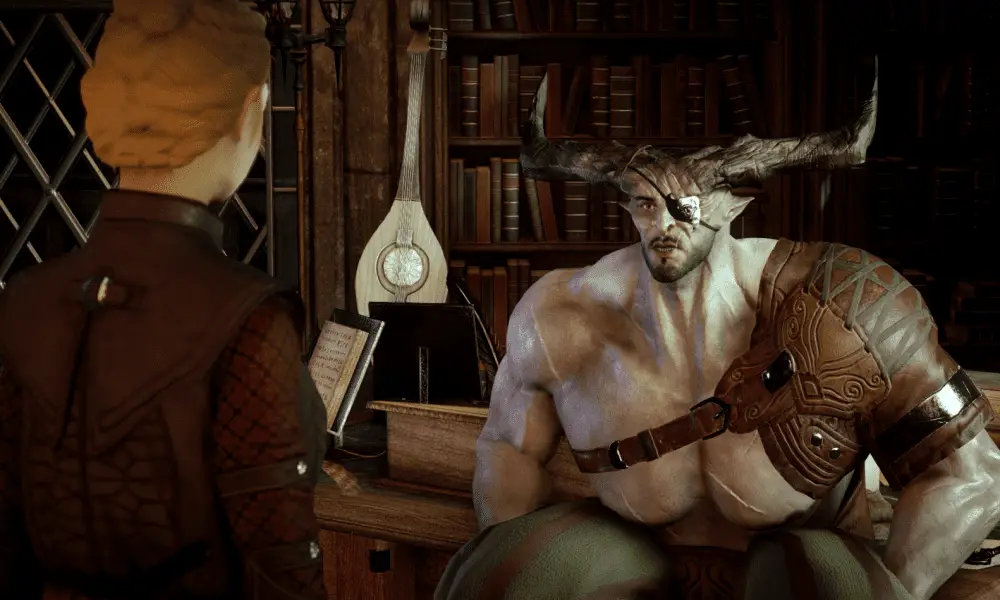
To say that Bull’s romance is unconventional would be the understatement of the year. I mean, I still wish someone’d had a camera on my face when, in answer to my female Inquisitor’s fruitless hours of flirtage, Bull finally responded… just not at all how I’d expected.
What makes that moment more impactful is that Bull’s the only character in the game who does not respond at all to early flirts. He doesn’t get shy or fumbling like Cassandra, Josie, or Cullen, and he doesn’t give you that wicked hint of sexiness that Solas or Dorian respond with either. Appropriate to a master spy, he’s absolutely unreadable—you get a “slightly approves” alert occasionally for flirtatious moments with Bull, but that’s it. And nothing else. Dozens of flirts, and Bull never says a word. He simply gives that tiny, inscrutable and maddening half-smile. Until he shows up with a proposition.
There is, of course, a very good reason for Bull’s careful maintenance of distance: to pull us to him. To make the Inquisitor the aggressor. He’s a self-admitted spy working a much more complex game than is first apparent, after all. Any blatant flirtation from Bull would only generate or increase suspicion. Instead, he simply stands back, keeps his distance, and gets us to throw ourselves at him before he finally responds.
And even then, his response is a brilliant chess move, a game-within-a-game, a way for Bull to control the relationship and to offer something that also sets the Inquisitor off-balance.
As for me, when Bull finally responded in my initial playthrough, I was delighted. Finally, my Beauty and the Beast romance could begin! I hadn’t found Bull hot at first, but as in life, I found him increasingly attractive as his story progressed and I realized just how smart and complicated he was. I hadn’t expected, however, for Bull to show up in my Inquisitor’s quarters… much less, for him to coolly proposition her with a secret, kinky, and purely sexual relationship with zero strings (except, ahem, for those he provided in the bedchamber).
The Rules of Engagement
Was I a little shocked? Sure, I mean, it was certainly not the kind of complex social or sexual scenario I was expecting to find in a high fantasy videogame that I’d originally played just to let out my inner Eowyn and kick some bad guys. And okay, yeah, I almost fell out of my chair and may or may not have actually dropped my mouse. (I’m kind of a human toon. Don’t judge me.)
But that’s also exactly why I liked it. Because, as offbeat and slightly edgy as Bull’s BDSM romance might be, it’s presented with a lot of nuance and care. There are zero issues of consent, for instance—Bull actually asks for consent three different times in the big seduction scene. Then, after a tasteful fade to black, there’s a morning-after conversation that’s even more interesting than the one the night before. Bull and the Inquisitor sit down and talk, calmly and respectfully, about the rules of their romance. It’s interesting to note that Bull is actually much warmer here than the night before, and he’s both caring, comforting, and thoughtful as he presents how the relationship would continue… if we choose. The entire sequence is an extended and beautifully written conversation by writer Patrick Weekes (who wrote Bull, Solas, and Cole) that remains one of my favorites across the trilogy.
From there, Bull’s romance can move forward in a lot of different ways—you can dump him after a single night, end things after a casual interlude, or he can dump you. If you act ashamed of your dalliance with him in a key scene, for instance, he responds with real dignity and ends the relationship instantly. It can stay a casual, playful friends-with-benefits situation, or evolve into real commitment. Or, in the darkest outcome, he’s playing you the entire time, using sex to pacify and control you.
Either way, what I like most about Bull’s romance is that, unlike almost any other romance in DAI, it starts with sex and goes from there. Sex isn’t the rom-com prize at the end of the story; instead, it’s just the way things begin.
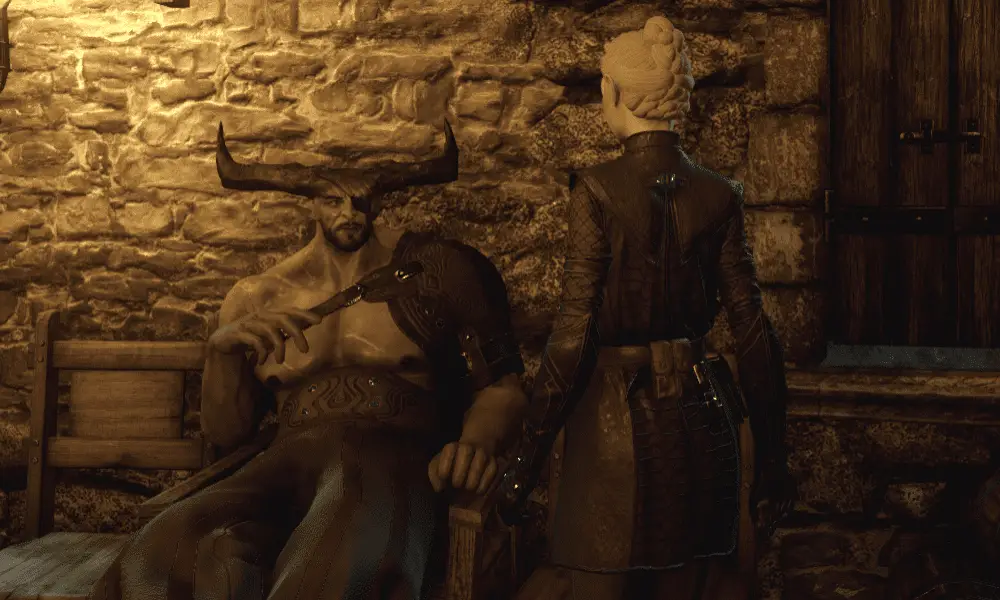
Sex and Lies Under the Qun
Bull’s romance then goes on to culminate in any one of a number of surprising potential outcomes in which the romance is successful, a sham, or a total bust. It also includes one of the funniest scenes ever found in a videogame, when he and the Inquisitor are caught in the act by a fascinated/horrified Cullen, Cassandra, and Josephine (“I cannot feel my legs,” whispers Josie, staring adoringly at the tastefully obscured vision of a naked Bull). It can also end on a pretty nihilistic pitch-dark note in the DLC “Trespasser.”
As a culture, the Qunari don’t allow romantic love. Sex is instead treated as either an impersonal release of tension, as part of spycraft, or as part of its breeding programs. What this does on a subversive level is provide the Inquisitor with the chance to bring something new to Bull’s relationship. He may be fabulous in bed, but the Inquisitor (or Dorian) can provide an experience of sex that goes along with love, trust, and real intimacy that he hasn’t experienced before.
The end of Bull’s romance, however, is determined by the Inquisitor’s choices. At a certain point with Bull, we’re faced with his loyalty quest, a choice between two tragic outcomes. We can save the Qunari dreadnought (and Bull will sacrifice his loved ones and recommit to the Qun), or save Bull’s self-made family, the Chargers (in which he will rebel permanently, going “Tal-Vashoth”).
If we choose to save the Chargers, Bull is wracked with self-doubt. But he’s also truly free for the first time in his life. His dialogue banters with the other characters become far more interesting since he’s no longer defending the narrow confines of life under the Qun. He progresses to real friendship with Solas, his former antagonist. His romance with the Inquisitor ends with a humorous exchange of pillow-talk that also includes love and real vulnerability in the face of potential loss.
If we tell Bull to sacrifice his people for the Qun (or if we don’t complete his loyalty quest), his romance will continue on as before. But there are some quietly chilling changes to that final scene that color everything before and after. We do not have the opportunity to declare love, and Bull won’t have the opportunity to either return that love or break down at the idea of losing us (both beautifully acted moments by voice actor Freddie Prinze, Jr.). Instead of those intimate possibilities, the Inquisitor will simply have the unpleasant awakening that Bull has been lying to them all along. Bull will end the scene by distracting with sex, and by placating them that “it wasn’t just a job.” But of course, we find out the real truth in the devastating betrayal of his final moment in “Trespasser”—that, in fact, there was “nothing personal” there at all.
Again, it just depends on the choices you make. Solas’s romance is most famous for its tragic elements, but to me Bull’s Qun-Loyal romance beats it for the sheer coldness of those final awful moments in the DAI romance, as well as in the final resolution of “Trespasser.”
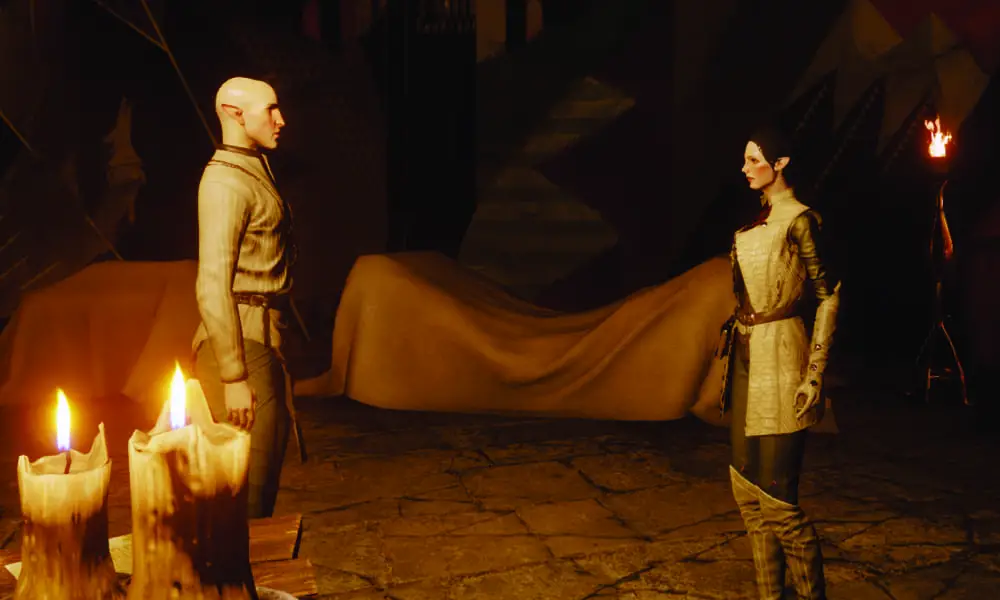
The Fallen God
That leaves me with my final favorite unconventional romance from the trilogy, and it’s a doozy—that of Solas.
I remember the day when, innocent as a lamb, I finished my first playthrough of DAI, after happily romancing Bull, and the credits rolled. All was right with the world… then Flemeth walked up to Solas and called him The Dread Wolf.
And once again, I practically fell out of my chair (I know, I do that a lot). And my first immediate clear thought beyond “Holy shit! HE’S A GOD?!” was, “I am romancing the crap out of this guy in my next playthrough!”
Which I immediately did (seriously, I’ve never restarted a game so fast in my life). I had already been really tempted to romance Solas in my first playthrough. Like Bull, he’s one of those characters whose hotness kind of sneaks up on you. When I first met Solas, for instance, I’d thought: “Huh. Beautiful voice. Not really into the whole pale bald-guy thing though. But hey, to each their own!” Then I bantered with him at Haven. It was a series of conversations that were by turns tense, argumentative, funny, charming, and even slyly sexy. Within minutes, I had fallen flat. I still remember my confusion when I looked at Solas after that moment and went, “Wait… when did he get hot?”
In other words, I’d definitely been tempted already, although I’d ultimately decided to stick with pursuing Bull. This made romancing Solas in the second playthrough even more fun, because now I was in on the secret. I could view the entire game story through an entirely different and far more fascinating lens.
And it was definitely worth it, as Solas revealed himself as an often surprising character whose layers are only really apparent when he’s romanced. He’s a constant surprise in the romance scenario—defensive, secretive, impulsive, and fiery—but also tender, funny, and openly sensual. He’s genuinely witty and bold in his responses to our flirtations, too. It’s one of the many ways in which, again, the character really confounded my expectations. When we’d first met Solas, for instance, my first impression had been that he was rather cold and monkish. Of course, the romance revealed that he’s anything but—he’s all fire beneath the surface, easily one of the most passionate characters in the story. Solas’s kisses are also really beautifully presented and rendered—they’re both hesitant and passionate, easily the best in the game.
For instance, take this wicked little early conversation with a female elven mage:
Solas: You train your will to control magic and withstand possession. Your indomitable focus is an enjoyable side benefit. You have chosen a path whose steps you do not dislike because it leads to a destination you enjoy. As have I.
Inquisitor: Indomitable focus?
Solas: Presumably. I have yet to see it dominated. I imagine that sight would be… fascinating.
Inquisitor: (laughs softly)
Ahem. So… let’s just say that I think Solas and Bull have more in common than might be readily apparent… on a number of levels.
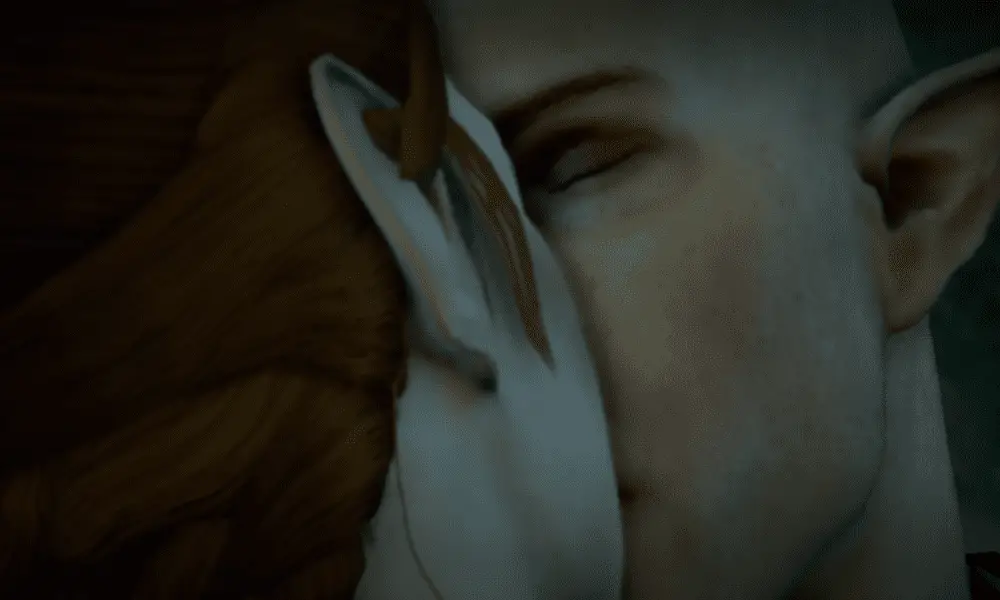
Dumped by Your Digital Boyfriend
Solas’s romance is interesting because he’s probably the most loved, hated, and hotly contested companion (tied perhaps with Anders) across the entire trilogy. And yet his romance is also easily one of the most popular across the Dragon Age fandom. It has inspired a near-endless number of tributes, memes, and fanfiction.
Me, I don’t think it’s a coincidence that Solas’s romance is easily one of the most tragic in the game. I think that’s part of the allure. Solas’s romance is irresistible. Let’s face it, the idea of a companion who falls in love with you, knows he shouldn’t, and yet cannot resist doing so, is pretty enticing. He carries a dreadful secret, a grief and guilt that Cole calls “vast across the Veil.” He’s living a lie for every moment he spends in the Inquisition. The last thing he should do is fall in love.
So of course that’s what happens.
But what I think is the real key to the popularity of Solas’s romance isn’t just that an ancient elven god has unwillingly fallen in love with you. It’s also that he ends that romance so coldly and brutally near the end of DAI. It’s never fun to get dumped. Me, I found myself surprised at just how pissed I was that my digital boyfriend had just broken my heart. Yet there is comfort to be found eventually. There are plenty of subtle signs through the rest of the story that Solas does in fact deeply love the Inquisitor. He even confirms it yet again, heartbreakingly, as DAI ends… and he leaves.
The Dread Wolf Unmasked
All of this is enjoyably tragic. But then we get the kicker that is the “Trespasser” DLC, which is honestly just a great big love letter to Solasmancers. The entire story revolves around discovering the truths and falsehoods behind the ancient elves, and specifically, about Solas himself. As we pursue the mystery, Solas’s presence is both elusive and yet constantly palpable. The story ends with a gorgeously rendered final confrontation between Solas and the Inquisitor, whom he has personally drawn there to rescue from the magical Mark that is now killing them. The meeting can last anywhere from a few minutes to 15, depending on how involved your character was with him, and depending on how many questions you’d like to ask the Dread Wolf when he’s unmasked at last.
Seriously, it’s a great payoff. Trevor Morris’s gorgeous music soars, and voice actor Gareth David-Lloyd’s Welsh-tinted voice is at its sweetest and most beautiful. Unmasked, Solas is open and warm and finally able to be honest. On a shallow note, he also looks fantastic in his ancient elven armor—no need for him to play the humble apostate now. While his goals are depressing (he basically wants to fix his mistake of millennia past, tear down the Veil, and return the world to the heights of Elvhenan), the Inquisitor has a number of interesting response choices, as they can either attack or empathize with him… or even offer to join him. It all ends with one final, tragic kiss before Solas walks off into the sunset-tinted eluvian. The Inquisitor can then either pledge to kill or redeem Solas as the cliffhanger of the entire story.
It’s all ridiculously emotional and fun, and at emotional levels that are downright operatic.
I’m still not okay about him dumping me, though. But that’s part of what I love about it, and I think that’s why it lingers on in the memories of so many other Solasmancers, too. Romancing Solas in Dragon Age: Inquisition is ultimately all the more painful because it’s a story that’s not over. Locked out of the ability to romance anyone else or move forward, the Inquisitor is still invested, bruised, betrayed… and waiting.
It’s just another day of love, sex, and lies in Thedas. Sure, it’s not real. But it’s weird how real it can feel at moments, even so.
Even a video game, it turns out, can still break your heart.
Images Courtesy of BioWare
This article is a reprint (with minor modification and expansion) of an article originally published by Angela D. Mitchell on DumpedDrunkandDalish.com.

